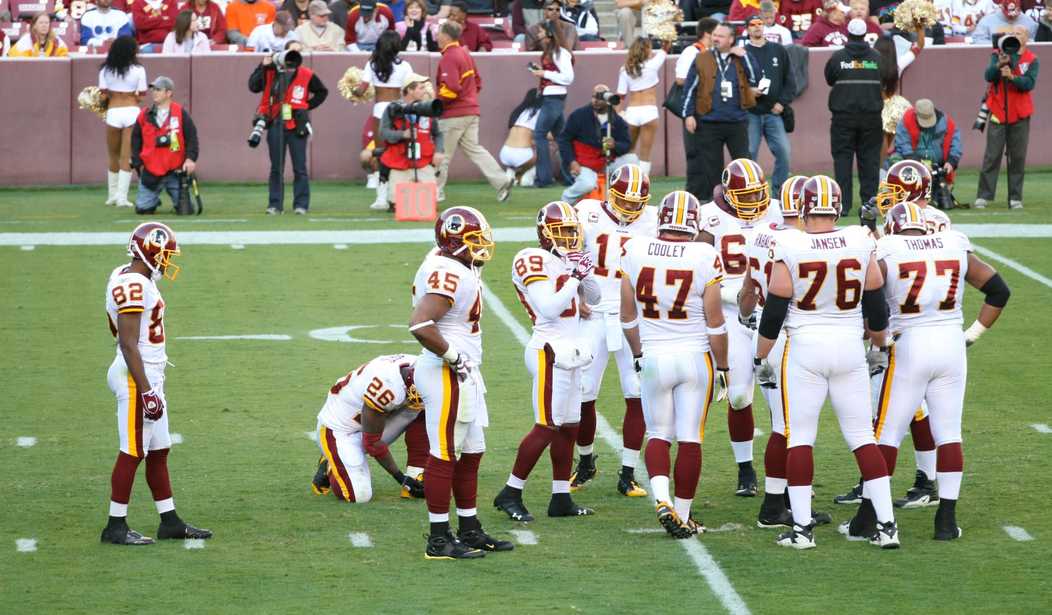WASHINGTON — In what D.C.’s football team is hailing as a victory for the disputed Redskins name, the Supreme Court ruled today that trademarks can’t be denied on the basis of the trademark office ruling that the term is disparaging.
Simon Tam, an Asian-American musician, was denied a trademark for his band name, The Slants, and went to court.
“Holding that the registration of a trademark converts the mark into government speech would constitute a huge and dangerous extension of the government-speech doctrine, for other systems of government registration (such as copyright) could easily be characterized in the same way,” Justice Samuel Alito wrote in the unanimous ruling (Justice Neil Gorsuch joined the Court too late to take part in hearing the case).
“The commercial market is well stocked with merchandise that disparages prominent figures and groups, and the line between commercial and non-commercial speech is not always clear, as this case illustrates,” Alito added. “If affixing the commercial label permits the suppression of any speech that may lead to political or social ‘volatility,’ free speech would be endangered.”
The American Civil Liberties Union hailed The Slants as “rock stars of the First Amendment.”
“The Lanham Act is a federal law that — until today — permitted the government to deny registered trademarks determined to be ‘disparag[ing],’ or otherwise ‘offensive’ or ‘immoral’ to a ‘substantial composite’ of an affected group. And despite the fact that the members of the Slants are themselves part of the ‘affected group’ in question, the [Patent and Trademark Office] found the name too offensive for a registered trademark,” wrote ACLU senior staff attorney Lee Rowland. “…Today the Supreme Court affirmed a core value of free speech: The government cannot withhold a benefit in order to limit or punish what it perceives to be offensive speech. And hopefully today’s decision will put a stop to the absurd practice of PTO examiners acting as formal speech police, Googling people to find out if they’re the ‘right kind’ to receive a government benefit.”
The Washington Redskins lost their trademark in 2014, a decision upheld by lower courts. Redskins attorney Lisa Blatt declared “the Team is thrilled with today’s unanimous decision as it resolves the Redskins’ long-standing dispute with the government.”
“The Supreme Court vindicated the team’s position that the First Amendment blocks the government from denying or canceling a trademark registration based on the government’s opinion,” Blatt added in a statement.
The Change the Mascot campaign said they were “gratified that this Supreme Court case amplified the intensifying public debate over the NFL’s support for bigotry against Native Americans” as activists have “invaluably raised awareness about the problems with mascots such as the R-word epithet used by the Washington NFL team, and brought the important issue of mascotization to the forefront of social consciousness.”
“This is an issue we have always believed will not be solved in a courtroom, and this ruling does not change some very clear facts. Washington’s football team promotes, markets and profits from the use of a word that is not merely offensive – it is a dictionary-defined racial slur designed from the beginning to promote hatred and bigotry against Native Americans,” National Congress of American Indians Executive Director Jackie Pata and Oneida Nation Representative Ray Halbritter said in a statement for the campaign.
“If the NFL wants to live up to its statements about placing importance on equality, then it shouldn’t hide behind these rulings, but should act to the end this hateful and degrading slur,” they added.
Rowland at the ACLU said the Redskins “undoubtedly” get to retain their name now, even though “unlike in the Slants’ case, there is no cultural reappropriation going on with the NFL team.”
“But there’s no way to lawfully censor speech that offends us without allowing the government the power to censor speech that offends anyone — including The Slants’ band name,” she said. “When we object to ideas that appear in our marketplace, the default response shouldn’t be to sweep them under a rug and pretend that they aren’t there, but rather call them out, boycott companies that make products that offend us, and ensure our spending reflects our values.”








Join the conversation as a VIP Member